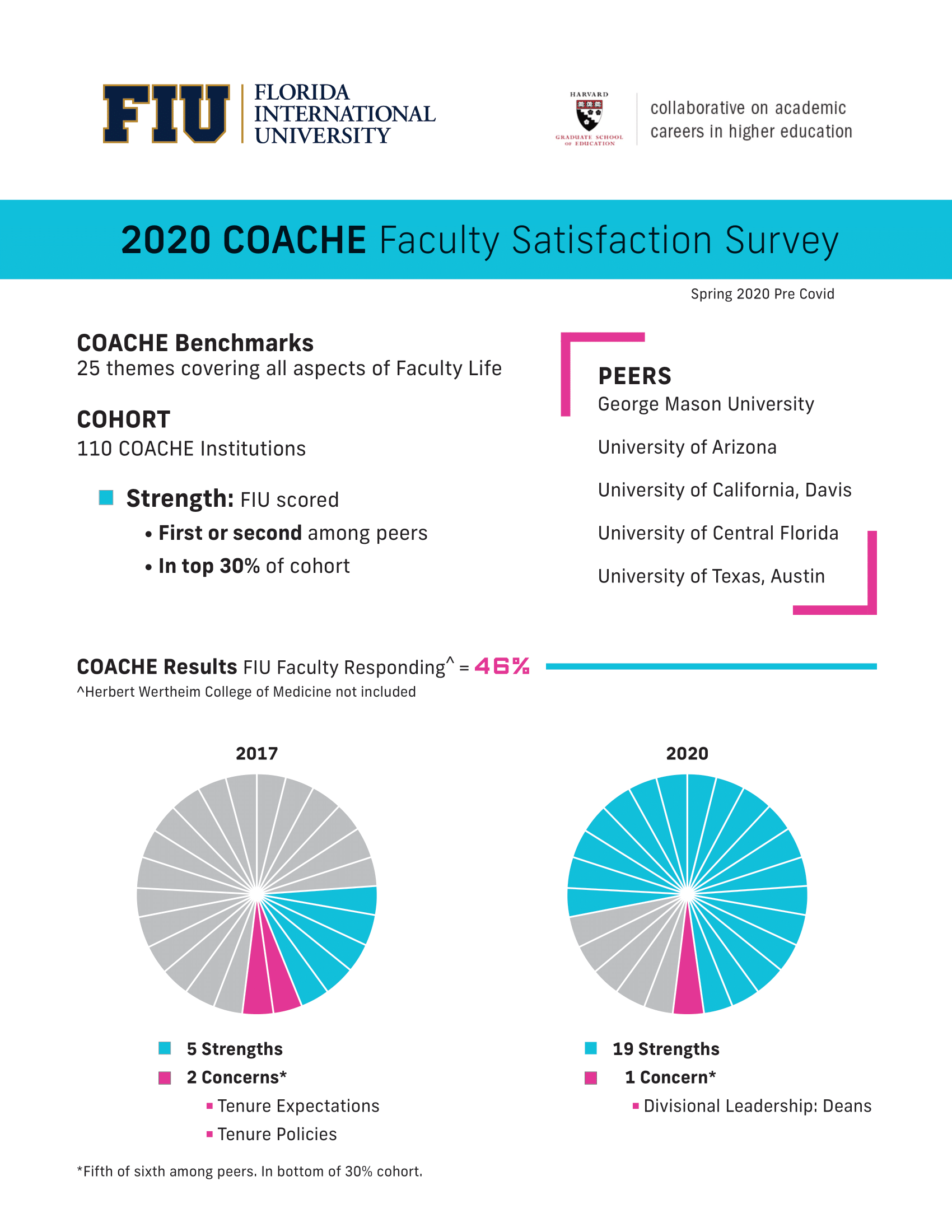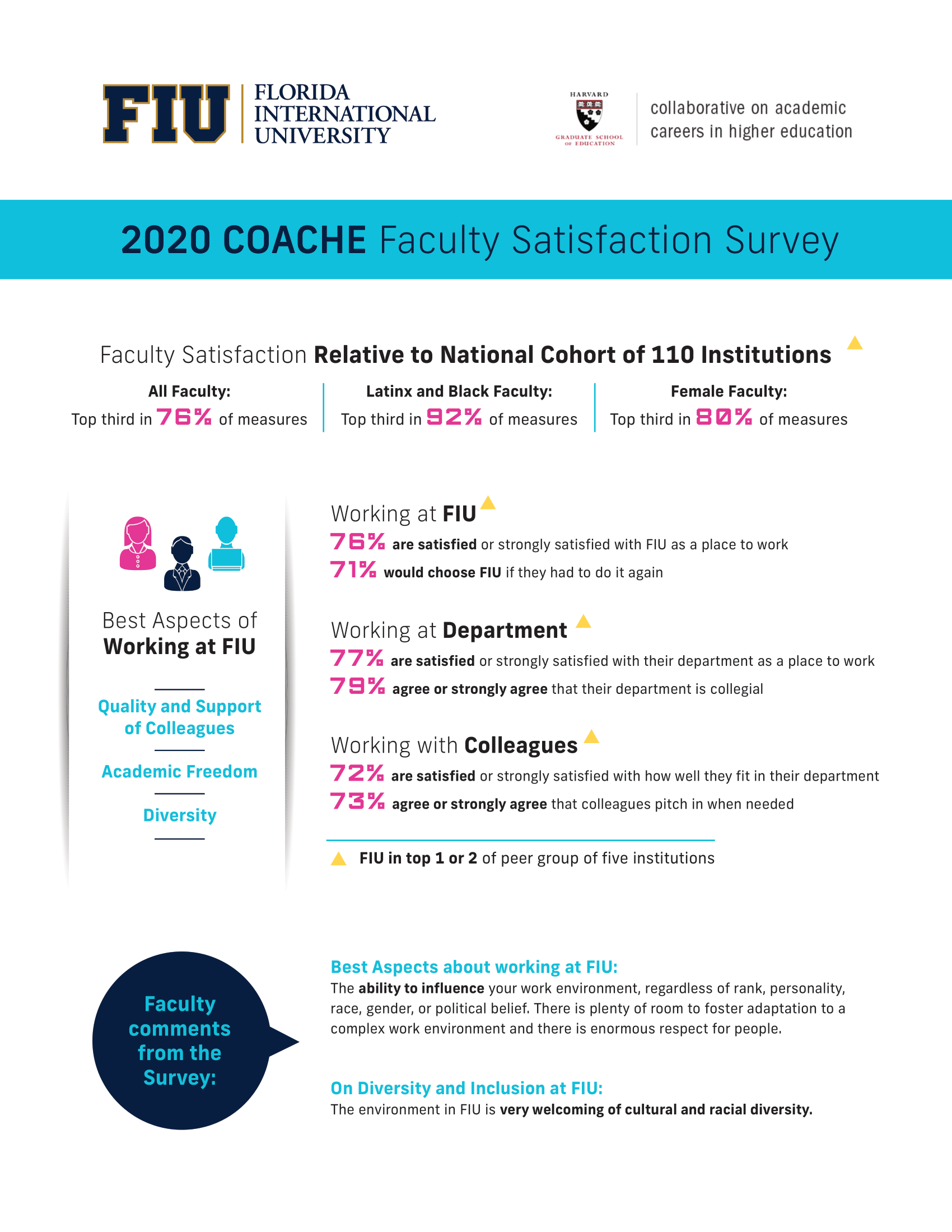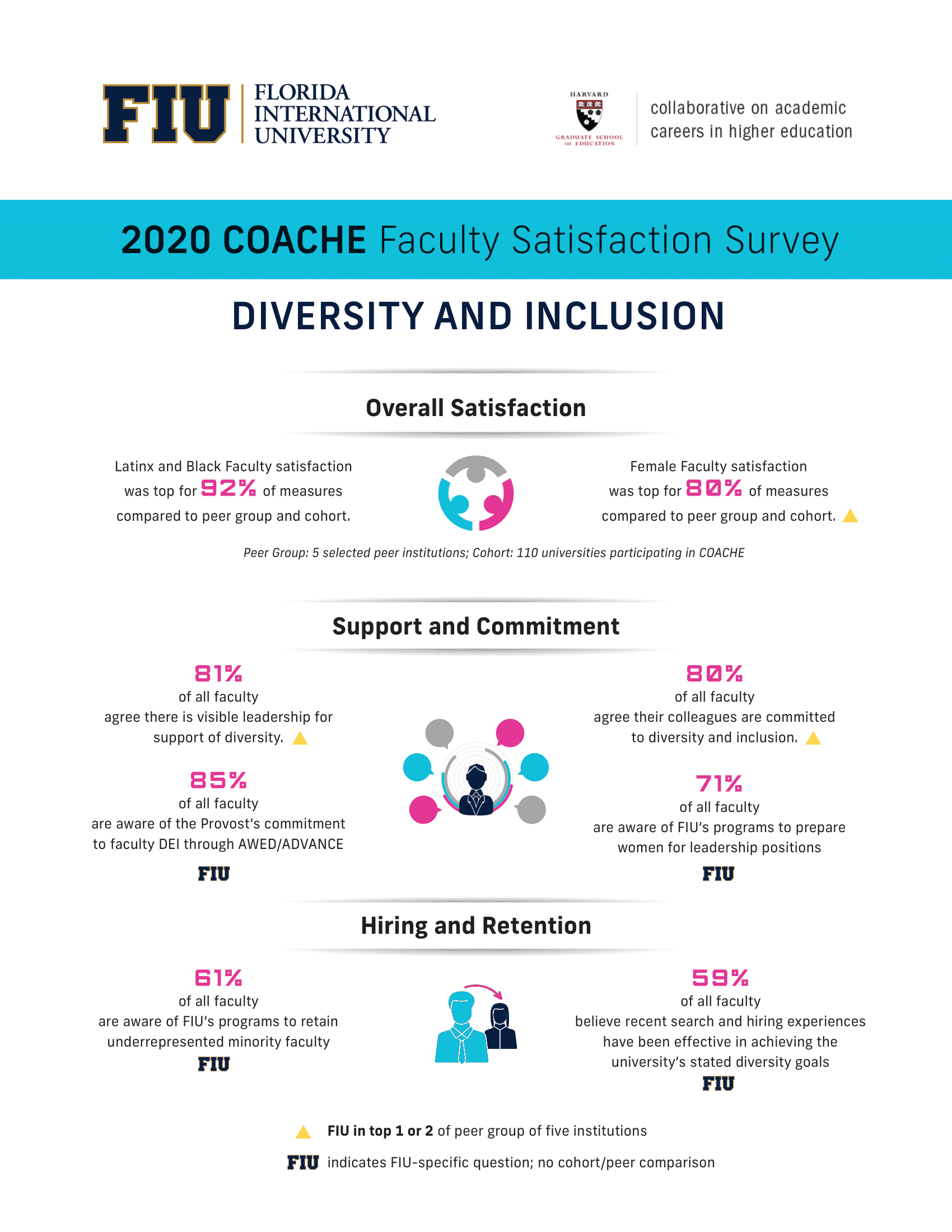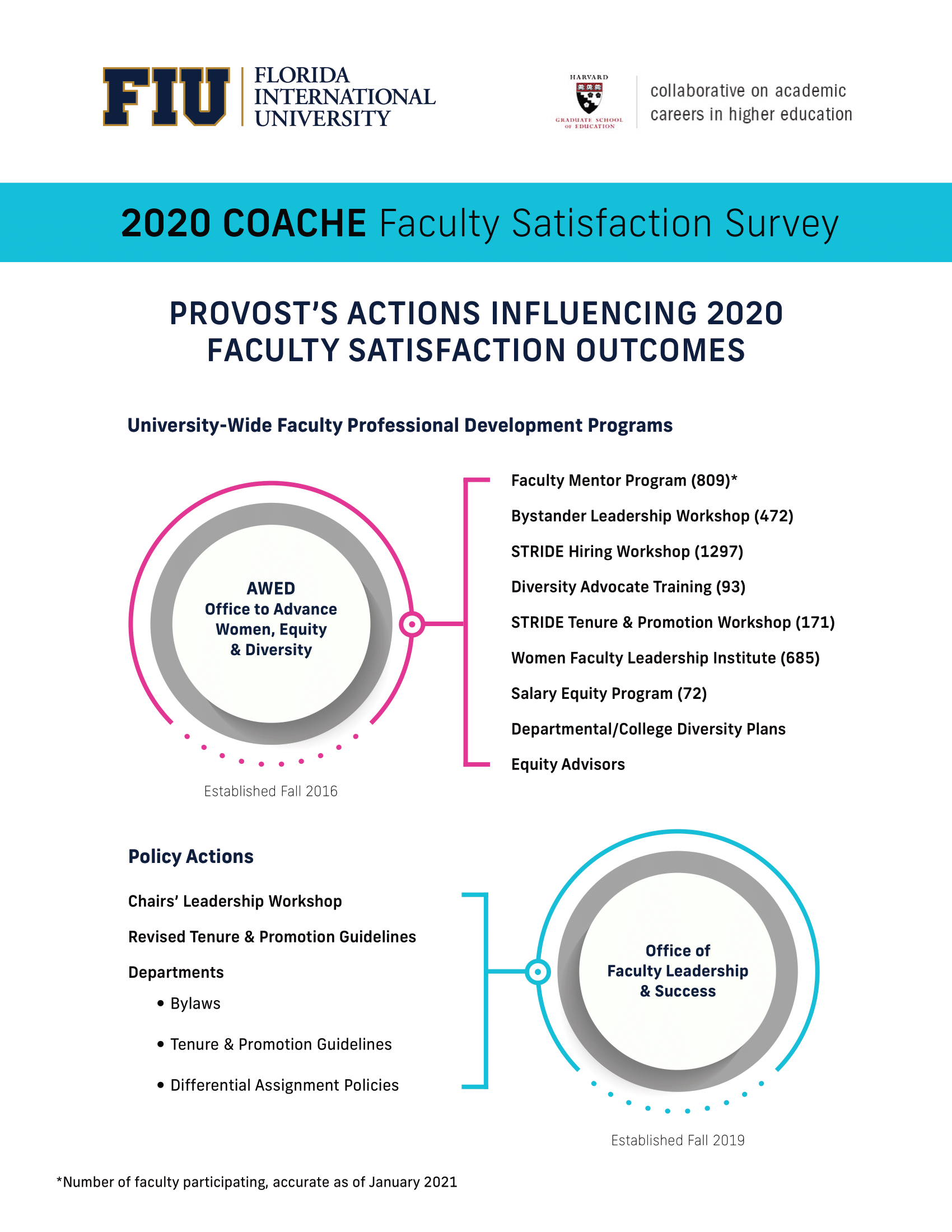Preliminary COACHE 2020 results were presented at a webinar on January 14, 2021. The slides for the webinar are available here.
Overall Results
Click on the images to enlarge.
The COACHE BENCHMARKS are the means of 25 survey themes, each consisting of several Likert-scale questions related to the theme. These means are used to compare the satisfaction of FIU faculty to those in the full cohort of 110 COACHE institutions and from a self-selected peer group of five institutions. A list of the benchmarks is available here.
The COHORT consists of 110 institutions that participate in the COACHE faculty satisfaction survey. A full list is available here.
The five PEER institutions were chosen by FIU to represent those most similar to FIU in the faculty labor market.
- George Mason University (2019)
- University of Arizona (2018)
- University of California, Davis (2017)
- University of Central Florida (2018)
- University of Texas at Austin (2020)
RESPONSE RATES: In the 2020 survey, 567/1230 (46%) of faculty, including non-tenure track but excluding the medical school, completed the survey. This is 1.5% higher than for our peer institutions, and 6% higher than FIU’s response rate in the 2017 survey. Divisional response rates by college ranged from 30% - 52%. The 2020 response rate was similar (+/- 3%) for all faculty ranks and demographic groups. Given an average survey completion time of 22 minutes, this report constitutes approximately 208 hours of faculty’s time and, more importantly, their candor.
AREAS OF STRENGTH/CONCERN:
- Area of strength: any Benchmark where your institution scores first or second among your selected comparison group of five and in the top 30 percent of the cohort of 110 institutions.
- Area of concern: any Benchmark where your institution scores fifth or sixth among your selected comparison group of five and in the bottom 30 percent of the cohort of 110 institutions.
In the 2017 survey, FIU had 5 Areas of Strength, and 2 Areas of Concern: Tenure Expectations: Clarity, and Tenure Policies. The 2020 survey showed an increase to 19 Areas of Strength and a decrease to 1 Area of Concern: Divisional Leadership.
Diversity
Click on image to enlarge.
The COACHE results provide information about how FIU faculty satisfaction with regards to diversity, equity, and Inclusion in several ways:
Overall Satisfaction by Underrepresented Demographic Group- Our Latinx and Black or African American faculty satisfaction ranks in the top 30 percent of the 110-institution cohort for 23/25 (92%) and in the top 1 or 2 of the five-institution peer group for 21/25 (84%) of the benchmarks.
- Highest comparative satisfaction means were in the areas of Nature of Work: Service, Personal and Family Policies, Health and Retirement Benefits, Leadership: Senior, and Appreciation and Recognition.
- Lowest comparative satisfaction means were in the areas of Tenure Expectations: Clarity, Leadership: Divisional, and Departmental Quality.
- Our female faculty satisfaction ranks in the top 30 percent of the 110-institution cohort and in the top 1 or 2 of the five-institution peer group for 20/25 (80%) of the benchmarks.
- Highest comparative satisfaction means were in the areas of Nature of Work: Service, Personal and Family Policies, Leadership: Senior, and Appreciation and Recognition.
- Lowest comparative satisfaction means were in the areas of Tenure Policies, Leadership: Divisional, and Departmental Quality.
- Our Asian or Asian American faculty satisfaction (not shown on the infographic) ranks in the top 30 percent of the 110-institution cohort for 19/25 (76%) and in the top 1 or 2 of the five-institution peer group for 17/25 (68%) of the benchmarks.
- Highest comparative satisfaction means were in the areas of Personal and Family Policies, Collaboration, and Departmental Engagement.
- Lowest comparative satisfaction means were in the areas of Nature of Work: Research, Tenure Policies, and Leadership: Divisional.
- From standard COACHE survey items:
- 81% (414/512) of all responding faculty agreed or strongly agreed with the statement that there is “ Visible leadership for support of diversity.” This is higher than all but one of our five peer institutions.
- 80% (438/516) of all responding faculty agreed or strongly agreed with the statement that their departmental colleagues are “ Committed to diversity/inclusion.” This is higher than all of our five peer institutions.
- From customized questions created by and for FIU and included in the COACHE survey:
- 85% (426/503) of all responding faculty replied ‘yes’ when asked if they were aware of the Provost’s commitment to faculty diversity, inclusion and equity through the programs of the Office to Advance Women, Equity, and Diversity (AWED) and FIU ADVANCE.
- 71% (358/504) of all responding faculty replied ‘yes’ when asked they were aware of FIU's programs to prepare women for leadership positions.
- From customized questions created by and for FIU and included in the COACHE survey:
- 61% (309/578) of all responding faculty replied ‘yes’ when asked if they were aware of FIU's programs to retain underrepresented minority faculty.
- 59% (293/461) of all responding faculty agreed or strongly agreed with the statement that recent search and hiring experiences have been effective in achieving the university's stated diversity goals.
Provost's Actions Influencing Outcomes
Click on image to enlarge.
Office to Advance Women, Equity & Diversity (AWED)
Established in 2016 by Provost Kenneth G. Furton, AWED aims to achieve and sustain faculty equity and diversity as an essential element of FIU's academic excellence. AWED develops and manages a wide range of programs to promote faculty inclusive excellence, including trainings to improve faculty hiring and promotion processes, faculty mentoring, and college equity advisors. Other initiatives to support faculty diversity include the Bystander Leadership Program, a workshop intended to develop a social system at FIU that supports and institutionalizes positive change among faculty, and the annual Women Faculty Leadership Institute, geared toward women faculty and designed to promote leadership and strategic career planning.
Office of Faculty Leadership & Success (OFLS)
Established in 2019, OFLS is focused on ways to provide support, increase efficiencies and communication, and to provide leadership opportunities and training for faculty. The office works with several stakeholders, such as the Center for the Advancement of Teaching, the Faculty Senate, the Office to Advance Women, Equity & Diversity, and the UFF-FIU to support FIU’s growing faculty in their academic life as teachers and scholars. The office is currently spearheading several policy actions, such as ensuring each department has by-laws and clear guidelines for scholarship and for tenure and promotion that are online and easily accessible.




